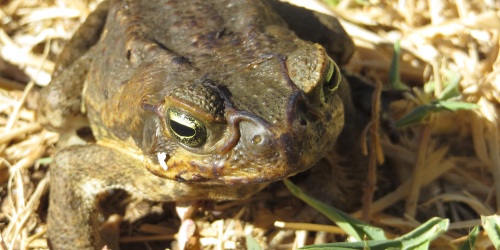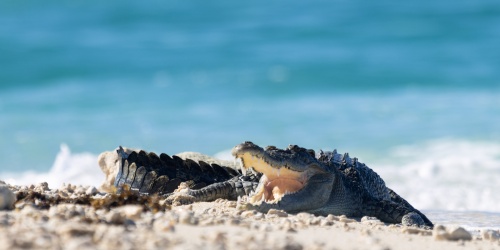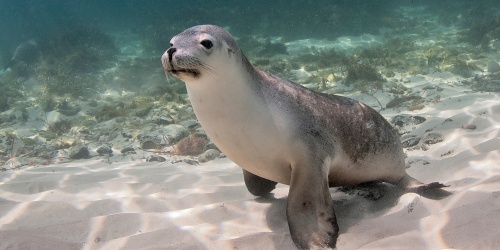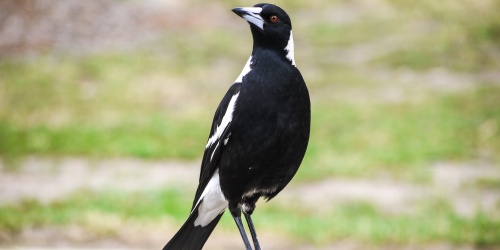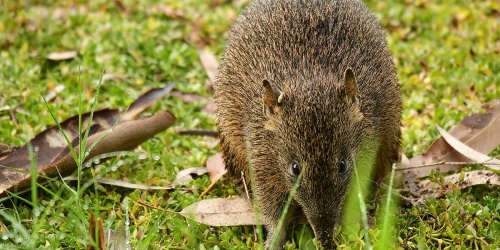Wildcare Helpline
The Wildcare Helpline is a telephone referral service operated by volunteers on behalf of the department.
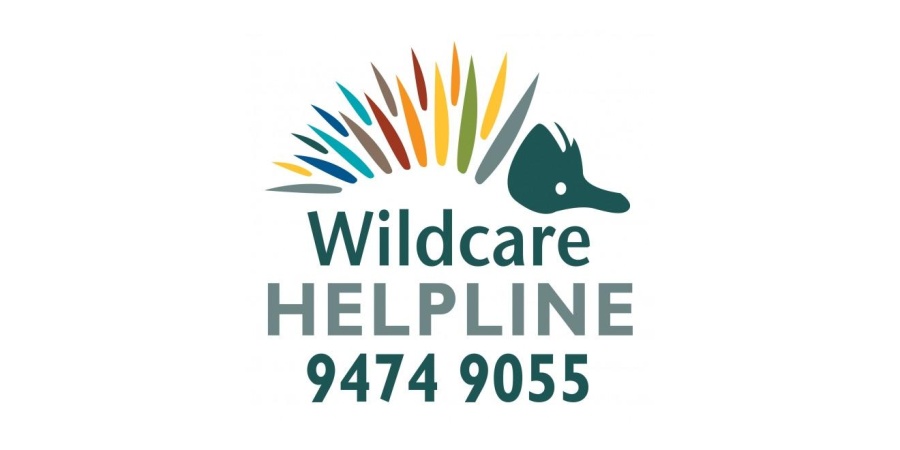
The Wildcare Helpline provides a service for the public who find sick or injured native wildlife and are seeking advice on where to find care for the animal.
Contact the Wildcare Helpline by calling 08 9474 9055.
The wildlife volunteers answering your call will be able to put you in touch with your nearest registered wildlife rehabilitator, wherever you are in Western Australia.
- The helpline can provide advice on snakes.
- If you see stranded whales or dolphins, call the helpline.
- Think you've found a cane toad? SMS a clear photo to 0400 693 807.
- If you find a healthy baby bird, it's probably best to leave it alone.
- If you think a seal or sealion needs your help, visit the Seal Wise page to confirm if the animal needs assistance before calling the Wildcare Helpline.
The Wildcare Helpline is managed on behalf of DBCA by WA Wildlife.
The Wildcare Helpline CAN:
- offer advice on sick, injured, or displaced native wildlife.
- refer callers to a wider network of experts for assistance.
The Wildcare Helpline CANNOT:
- attend rescues.
- assist with non-native or domestic animals.
- Contact the RSPCA for emergencies and acts of cruelty
- Contact your local council/shire for stray or nuisance animals
Other agencies that may be able to help if the Helpline is busy:
- Vet24-Balcatta – 08 6318 5300 (24hrs)
- Darling Range Wildlife Shelter – 08 9394 0885 (office hours)
- Kaarakin Black Cockatoo, Martin - 08 9390 2288 (office hours)
- Kanyana Wildlife, Lesmurdie – 08 9291 3900 (seven days a week 8.00 am – 6.00 pm)
- Murdoch Vet Hospital – 1300 652 494 (24hrs)
- Native Animal Rescue, Malaga – 08 9249 3434 (seven days 9am to 5pm)
- WA Wildlife Hospital, Bibra Lake – 8:30am to 7pm - 9417 7105 (24 hrs)
- WA Seabird Rescue – 08 6102 8464
South West Region
- Emergency Wildlife Care Bunbury – Doreen M: 0418 928 439; Vicki M: 0409 158 069
- Mandurah Wildlife Rescue – P:(08) 9582 3938
- F.A.W.N.A – various areas
- Maroo Wildlife Refuge Manjimup – Jo: 0409 086 973, or Glen: 0429 727837
Goldfields Region
- Goldfields Native Animal Care Inc - 0417 676 898
Wildlife rehabilitators are dedicated people who, in most cases, are employed in full time jobs and rehabilitate wildlife in their own time. We cannot always guarantee that someone will be immediately available so please be patient, particularly in busier times.
In the meantime, follow the advice below. Please do not feed the animal or give it water as this may delay treatment and could compromise the animal's recovery.
Basic first aid for wildlife
If you find sick or injured wildlife, the best thing you can do to increase their survival chances is to take them to an experienced wildlife rehabilitator or vet.
- To find your nearest one, call the Wildcare Helpline on 08 9474 9055.
- They hold a list of registered volunteer rehabilitators across Western Australia.
- Do not keep wildlife without seeking expert advice, as the animal may not survive.
You should contain the animal securely so that it does not injure itself further or injure you.
- If you are worried about picking up an animal, get someone to help.
- Use a towel or similar to place over the animal and gently pick it up.
- Place it into an appropriately sized, ventilated box.
Keep the animal:
- WARM
- in the DARK
- in a QUIET place.
This reduces stress levels and makes transportation easier. It’s also important to have as little contact with the animal as possible. Bats may carry and pass on lyssavirus. If you find an injured bat do not pick it up without suitable protection, such as thick leather gloves, and place into a suitable container immediately.
Do not offer food or water unless advised to do so by a rehabilitator. (Definitely NEVER bread or milk!)
Always wash your hands thoroughly after handling wildlife.
Remember your own safety as well as the safety of the animal.
- Injured wildlife will be frightened and stressed, and can be very dangerous.
- Be careful of teeth, claws, beaks etc when approaching and handling.
To assist the rehabilitator and the future release, note:
- the location that you found the animal
- the time of day
- what condition it was in when you found it.
Helping wildlife in spring and summer, and during bushfires
Baby Birds
In spring and summer you often see young birds sitting or jumping on the ground, with no parent in sight. This is normal behaviour and is not a cause for concern.
As tempting as it is to 'rescue' a young bird on the ground, in most cases it is not necessary, and may, in fact, drastically reduce its chances of survival.
Only remove a bird as a last resort when you are certain it needs your help, such as if it is:
- injured
- definitely abandoned
- definitely orphaned.
If you are unsure, leave the bird where it is and contact the Wildcare Helpline for advice.
Fledglings
If the bird on the ground has feathers, leave it alone and watch it from a distance.
It is likely to be a fledgling, and usually the parents are not far away and will return with food. They may be a while—possibly hours—but it is perfectly normal for young birds to leave the nest before they can fly, seeming to be left alone.
Nestlings
If it is a nestling with fluffy down and no feathers, it is likely to have fallen accidentally. If it looks healthy and uninjured, place it back in the nest if possible.
If this is not possible, make a makeshift nest (such as from a hanging basket or small shallow box) and carefully place it as high in the tree as possible, on a nearby branch or somewhere off the ground and out of danger.
Contrary to popular belief, parent birds will not reject their young if you pick them up—birds generally have a very limited sense of smell.
Again, the parents won't be far away. If you are unable to place a healthy chick back in its nest or out of danger nearby, then you need to get it to an expert rehabilitator as soon as possible if it is to survive.
It is very unlikely for parents to abandon their young. However, sometimes parent birds will reject young if they are unhealthy or if there is not enough food available – they concentrate their efforts on the strongest and healthiest ones.
If you believe the bird is injured, contact the Wildcare Helpline on (08) 9474 9055 immediately. They will give you contact details for your nearest wildlife rehabilitator. Be aware that survival rates for very young birds are low, and many rehabilitators cannot take them.
Feeding wild birds
Do not feed wild birds. Wild birds do not need supplementary food to survive or to raise their young.
However, try to always have a fresh water available in a bird bath. NEVER feed wild birds bread or milk—they can be harmful to birds.
If you are unsure, or just need further information, call the Wildcare helpline on (08) 9474 9055 for advice and contact details of your nearest wildlife rehabilitator.
Life stages of nesting birds
Hatchlings
- Altricial - newly hatched, sometimes unfeathered with eyes closed and confined to the nest. Usually passerine (perching birds), such as finches or ravens.
- Precocial - newly hatched with feathers/down and can leave the nest almost immediately, such as ducks.
Chicks
Young or 'baby' birds are known as chicks.
- Nestling - a bird that is too young to leave the nest – usually unfeathered or downy
- Fledgling- a young bird that has fledged—it has left the nest, but still may not be fully flying.
They are usually feathered and may be jumping around or flying erratically. This is them learning to fly and is perfectly normal. - Juvenile- a young, fledged bird that can fly but has not yet reached sexual maturity
Most garden birds will take between 14 and 28 days from hatching to leaving the nest (fledgling).
Ducks and ducklings
July to September is breeding time for ducks - before then they are looking for safe places to nest and raise their young.
If you see two ducks wandering around your yard but there doesn’t seem to be a nest then it is likely they are seriously considering your back yard as a nest site. If you don’t want them to stay, now is the time that you should chase them off at every opportunity and, if you have a pool, cover it. They are very persistent but if you are too you can make them know they won’t have a peaceful nest and they will move on.
Ducks often nest a considerable distance from wetlands and, being well adapted to urbanisation, they are often in backyards as they feel secluded and safe from predators. Ducks are secretive and they could be incubating before anyone is aware of their presence.
Nests are usually under shrubbery or amongst tall grasses, but can be in tree hollows off the ground. If you find a nest with eggs it must be left alone, and keep pets away – it’s an offence to disturb nesting birds or to remove eggs.
As the last egg (of around 12) is laid, the female starts to incubate and she rarely leaves the nest apart from short breaks to feed and stretch her legs. She doesn’t need to be fed - she’ll be eating grass, slugs and snails (great for your garden – don’t use slug pellets as these will be harmful).
The eggs hatch approximately 28 days after laying and the following morning the mother will lead the young to water.
If you don’t want them to return next year (they will), think about why they chose that spot and make it less attractive to them once they’ve gone.
If you have ducks or ducklings in your pool:
Ducks are attracted to swimming pools as they can clearly see there are no underwater predators that may take them or their young. However, there is nothing edible for them and they can find it difficult to get out. It is a good idea to turn off the filtration system as the ducklings may get sucked into it.
The best method in preventing ducks from using your pool is to use a pool cover. Other preventative measures include floating devices such as pool noodles or inflatable pool toys – ones with faces / eyes work best – however, ducks will soon catch on that they are harmless so these aren’t permanent solutions.
Ducklings will struggle to get out if the edge or steps are too high. Place a ramp for them to walk up. A piece of shade cloth or lattice fencing resting up the side of the pool is very effective.
If you see ducks or ducklings on the road:
When the mother leads her young away (she knows where she’s going), leave gates open, keep pets inside and the pool covered. It can be a reasonably long walk (for a duck) which invariably involves crossing roads and / or cycle paths.
Ducks on the move have been known to bring major highways to a halt, so road users should try to avoid them without endangering themselves or other road users – the best advice is to slow down.
For your own safety, do not go onto or near the edge of any road to rescue ducks – contact police on 131 444. The police are the only people who can control traffic if necessary.
Relocation
Unless the birds are in immediate danger it is not recommended that you attempt to relocate them.
If you think the ducklings have been abandoned - it is quite normal for them to be left for a few hours by the mother as she goes off for a feed - observe from a distance for a while to see if she returns. Call the Wildcare Helpline (9474 9055) if you’re unsure.
While ducklings are able to feed themselves as soon as they hatch, abandoned ducklings require a lot of care until they fledge (at around 50 days) and become independent. This is a long and avoidable process that greatly reduces their chance of long term survival and puts unnecessary strain on wildlife rehabilitators.
It can also be dangerous if they are relocated to unsuitable areas – ducks can be territorial and do not tolerate stray ducklings close to their own brood, attacking strange young they come across.
Bushfires
When bushfires occur the Wildcare Helpline and wildlife rehabilitation centres are inundated with calls from the public needing assistance with injured wildlife. It is encouraging to know that people care so much about our wildlife, but please always remember that your safety comes first.
Many calls we take are from people wanting to assist with the rescue of injured wildlife in a direct way and while these offers are appreciated at times of crisis, it is best for any wildlife found to be cared for by vets or registered rehabilitators. To find your nearest vet or registered rehabilitator call the Wildcare Helpline.
It is important for people who are in areas affected by fires to keep these things in mind to help wildlife:
- Do not attempt to enter any fire areas until authorised to do so by fire control officers.
- Keep pets indoors and under control wherever possible.
- Leave bowls of water out for animals escaping the fires – but do not leave food out for wildlife in national parks
- Keep a cardboard box and towel in the boot of your car in case you find an injured animal – if you rescue an animal that has been burnt, wrap it loosely, place it in a cardboard box and keep it in a dark, quiet and warm place.
- Then, call the Wildcare Helpline for advice, or take it to a local vet or wildlife rehabilitation centre for assistance if you know where one is.
- Make water available in bowl or similar.
- Do not try to feed the animal, as it may impede any treatment.
The Wildcare Helpline’s network of wildlife rehabilitators are dedicated volunteers who in most cases are employed in full time jobs and rescue and care for wildlife in their own time. As such we cannot always guarantee that someone will be immediately available to care for the animal so please be patient.
In the meantime please confine any injured animal safely and keep it warm in a dark, quiet place until you can get it to help. Please do not feed the animal or give it water as this will delay treatment and may compromise the animal's outcome.
If you wish to donate equipment or your time as a volunteer please contact one of the wildlife centres for advice on how best to do so.
Helping wildlife in your neighbourhood
You can help native wildlife in a number of ways, without too much effort:
Feeding wildlife
Don't feed birds or other wildlife as this can:
- cause aggression
- attract predators
- unnaturally increase population numbers
- increase the risk of disease.
Instead, put a bird bath in your garden and regularly top up with fresh, clean water. This is especially important in hot weather.
Local plants
Plant local native plants in your yard and verge. This will:
- provide native fauna with natural food and shelter
- plus they are also water-friendly.
The Wildflower Society of WA and Friends of Kings Park have lists of suitable plants, and information on how to get and grow them.
Nest boxes
Nest boxes are a great alternative to compensate for the loss of natural nest sites in the wild by providing suitable nest sites for birds, bats and even possums.
A well-positioned possum box will also encourage possums to nest somewhere other than your roof.
There are lots of plans for different types, depending on what you want to provide for.
- Nest Boxes for Wildlife1.4 MB
Pesticides
Avoid using pesticides in the garden.
- Encourage natural predators to take care of bugs—try building an 'insect hotel' to provide a home for pollinators and natural pest controllers.
- If you have a mice or rat problem, there are methods to try first before resorting to poison.
- Rats and mice look for food, shelter and breeding sites. By tidying up and removing the things they need, like long grass, untidy sheds and accessible pet food, they'll move on to where they are available.
Pets
- De-sex pets to prevent unwanted litters.
- Under the Cat Act 2011, all cats in Western Australia must be de-sexed.
Many councils offer discounted de-sexing (often with micro-chipping), which also makes your cat/dog licence cheaper. - Never dump unwanted animals.
- Cats
- Keep cats indoors or build them a secure run for exercising.
- If they do spend time outside, make sure they wear at least one bell (two is better!) as a warning to wildlife.
- Always make sure your cat is inside after dark.
- Dogs
Control your dogs' behaviour, and:- always keep them on a lead during walks
- always walk in areas designated for dog walking.
- be extra vigilant during bird breeding season (spring / summer) as dogs can sniff out nests and scare off the adult birds who may abandon the eggs or young.
Driving
- Be aware of wildlife when driving.
- Look out for road signs and slow down, particularly during breeding seasons.
Litter
Dispose of litter responsibly.
- Large numbers of wildlife, on land and in the sea, are harmed by:
- discarded drinks cans
- glass
- plastic bags
- elastic bands
- fishing tackle (including hooks and line)
- cigarette butts
- balloons
- ...the list is endless.
Injured kangaroos
If you are near a road - be aware of traffic, use caution and put your safety first. Do not walk onto a busy or dangerous road. The police (131 444) or Main Roads (138 138) may be contacted for assistance if there is a road hazard.
Caution! Kangaroos have a strong kick and sharp claws and may be dangerous. Injured animals will be stressed and can be unpredictable.
Do not approach the animal or attempt to catch it - chasing an injured animal may result in a worse injury and unnecessary stress for the animal. Remember the animal is wild and may feel stressed or threatened by your presence - stay calm, speak softly, move slowly. Secure the area and try to prevent other people or pets approaching the injured animal. Watch from a distance to see if it needs help and if so, contact the Helpline.
Be sure to check the surrounding area for any young nearby. If you find a baby animal, wrap it up to keep it warm and contact the Helpline for advice.
Volunteering
The volunteer-run helpline receives around 10,000 calls each year from members of the public concerned about sick or injured native wildlife.
Volunteers take enquiries and offer advice to callers. If there is a need, they may also refer callers to a further volunteer network of registered wildlife rehabilitators who can take care of wildlife before releasing back into its native habitat.
The helpline also provides advice for callers who have snakes on their property.
Helpline volunteers need patience, a clear telephone voice and must enjoy talking to people from all backgrounds. Also, often callers may be distressed so a calm disposition is useful.
Training is provided and there is strong support from other volunteers and staff. Wildlife knowledge is not essential, but a desire to help native wildlife is.
Some basic keyboard / computer knowledge is also helpful, but not essential.
To volunteer, email coordinator@wildcarehelpline.org.au.
